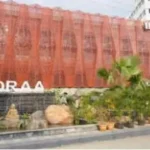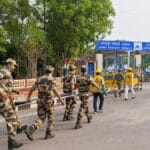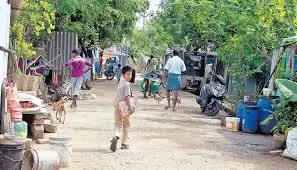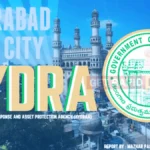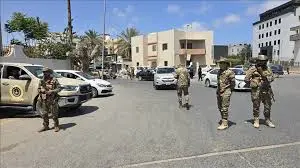- The Madrasi Camp Tamil identity crisis is unfolding in Delhi, where children from the decades-old settlement fear not just the loss of shelter, but the erasure of their linguistic and cultural identity. With school being their only source of Tamil education, the looming eviction threatens to sever their connection to their roots.
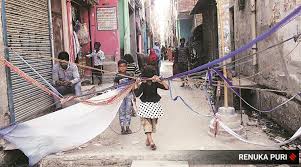
After receiving demolition orders, 189 Tamil residents of this Jangpura jhuggi jhopdi cluster were given DDA apartments in Narela, which is 50 kilometers distant. The distance might be too far for the kids who attend the Delhi Tamil Education Association (DTEA) School at Lodhi Estate.
Two packed school buses and three packed vans leave Madrasi Camp, a jhuggi-jhopdi (JJ) cluster in Jangpura, at 8.10 am every day to transport Tamil Nadu children to the Delhi Tamil Education Association (DTEA) School in Lodhi Estate. The entire five-minute travel requires some students to stand. They don’t mind, though.
Amid the Madrasi Camp Tamil identity crisis, these children attend school not just to learn standard subjects like Hindi and English, but for the comfort of learning Tamil, their mother tongue, in a place far from their ancestral home.
Among them is Monish (13), a pupil in Class 7. However, he hasn’t been as motivated to go to school lately. Although the BJP promised in-situ homes in the lead-up to the Assembly elections, his family, like all other occupants of Madrasi Camp, has received demolition warnings from the Delhi Development Authority (DDA).
Madrasi Camp Tamil Identity Crisis: Narela Relocation and School Fee Struggles Amid Demolition Threats
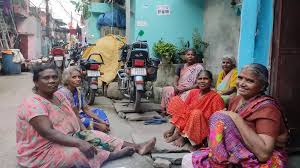
They are among 189 of 370 residents who have been allotted flats in Narela, built by the DDA in 2012, nearly 50 km away, in the midst of the ongoing Madrasi Camp Tamil identity crisis.
Kaviyasaran (17), a DTEA School Humanities student who had passed his Class 11 examinations, was playing carrom outside Kartik Shivam Mandir at Madrasi Camp on a school day. “Our parents stopped paying school fees for the year after they received the demolition notice,” he stated.
“During the (Delhi) elections, we were at ease. Politicians visited often and kept reassuring us that we would not be evicted without being given proper housing in the same area. But now, it feels like our homes could be taken away any day… There is constant security deployment… and Narela is so far away,” said a resident, reflecting the growing anxiety amid the Madrasi Camp Tamil identity crisis.
“The first thing we checked after we were allotted flats was how we would get to school. It takes at least two hours to reach Lodhi Estate from there,” he added, highlighting the challenges faced by children amid the Madrasi Camp Tamil identity crisis.
Narela boasts broad streets with rows of buildings and smooth roadways. The high-rise towers’ perimeter walls are delineated by trees and plants. It is strangely quiet, however, in contrast to ordinary residential buildings. Most of the skyscrapers that await Monish’s family and numerous others are deserted.
Siva, another resident of Madrasi Camp, said, “No other school will do this for our children. DTEA is the only place where our children learn Tamil — our language, our identity. There’s a small school near Narela, but it’s not close by, and the area isn’t safe. We can’t let our children travel there alone,” reflecting the deep concerns sparked by the ongoing Madrasi Camp Tamil identity crisis.
“We want our kids to go to school so they don’t have to go through what we went through in our lifetimes,” he continued.
At Lodhi Estate, the intricately built white and powder-blue DTEA school — adorned with decorative stones and plants, marble statues, and filled with the sounds of chatter and laughter — may soon find its classrooms comparatively empty, as the Madrasi Camp Tamil identity crisis threatens to displace many of its students.
These schools, which were established to help economically underprivileged Tamil families, are cultural hubs in addition to being educational establishments. With modest donations from the public, the first DTEA school was founded on Mandir Marg in 1924 to meet the demands of the Capital’s expanding Chennai and Madras populations.
In response to rising demand, primary schools were opened at Lodhi Estate and Karol Bagh in 1951 and 1953, respectively. By 1956, the Lodhi Estate branch had started offering higher secondary education. Today, there are seven such schools across Delhi — but not a single one lies within a 35-km radius of Narela, exacerbating the challenges brought on by the Madrasi Camp Tamil identity crisis.
A distinguished list of alumni, including several Padma Shri and Padma Bhushan recipients, UN committee members, political figures, and movie stars, can be seen on the Lodhi Estate school’s website. Among them are famous South Indian music composer Ramani Bharadwaj, Bollywood actor and MP Hema Malini, V Krishnan, co-founder of JustDial, K Ganesh, entrepreneur and promoter of BigBasket, Portea Medical, Bluestone, HungerBox, and FreshMenu, and Usha Thorat, former deputy governor of the Reserve Bank of India.
“For us, learning Tamil is of utmost importance. For decades, our school has stood as an anchor to the aspirations of the Tamil diaspora in Delhi,” a teacher said on condition of anonymity, highlighting the significance of education amid the Madrasi Camp Tamil identity crisis.



